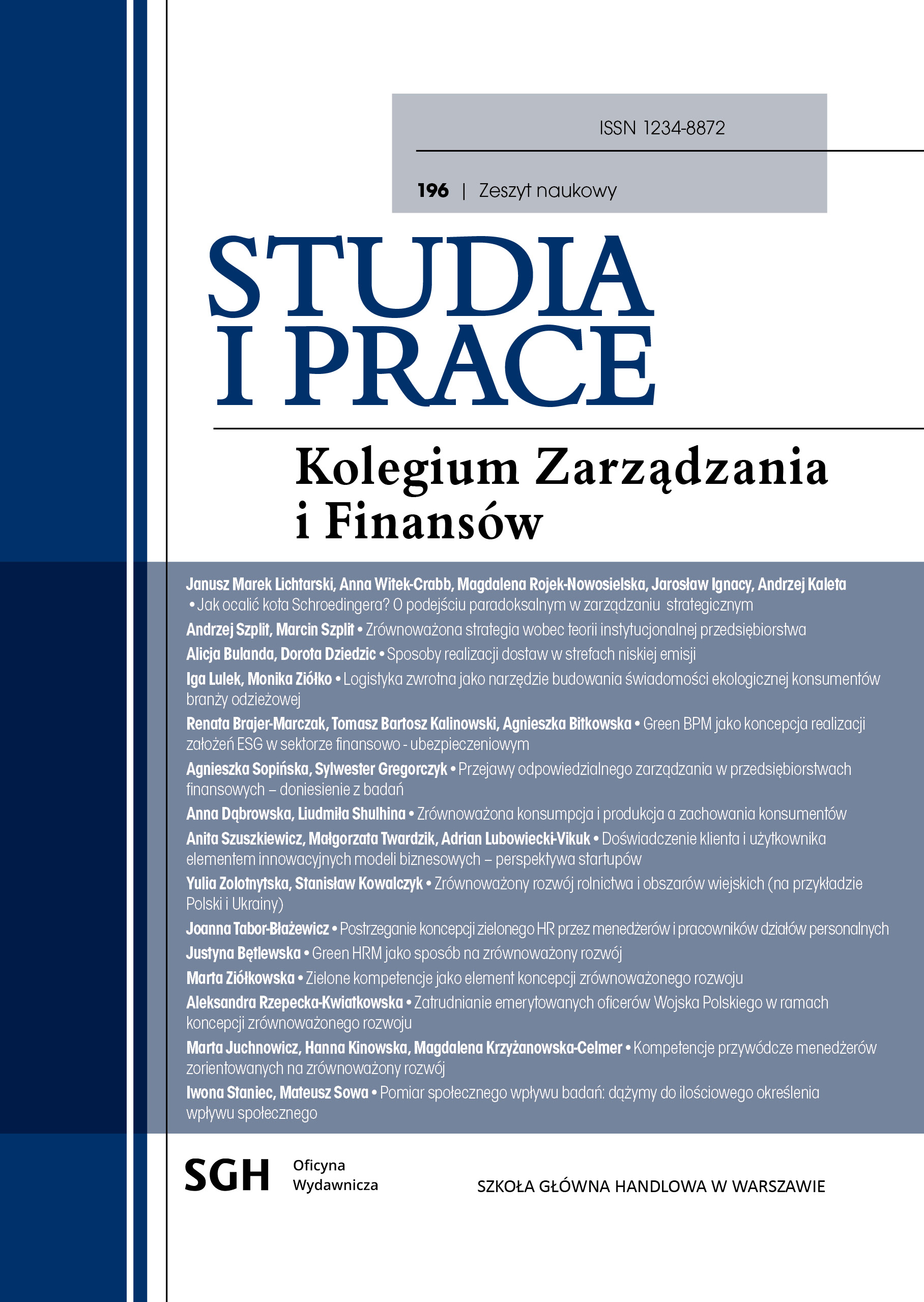Reverse logistics as a tool for creating environmental awareness among apparel consumers
DOI:
https://doi.org/10.33119/SIP.2024.196.4Keywords:
apparel recycling, reverse logistics, sustainability, green consumer awareness, apparel returnsAbstract
The article presents the topic of reverse logistics in the apparel industry and its role as a tool in creating environmental awareness among customers. It discusses various aspects of reverse logistics, including tools such as recycling campaigns that promote the return of goods in exchange for a variety of customer benefits. It also presents examples of companies such as Wólczanka, The North Face, and Patagonia which use innovative solutions in reverse logistics to promote recycling and extend the life of products. The authors also conducted a pilot study among apparel consumers to assess their awareness and preferences regarding reverse logistics. The results indicate low consumer knowledge in this area. The respondents often shop online, which can lead to an increase in returns due to the lack of opportunity to try on merchandise. The study’s conclusions suggest the need to increase consumer awareness of green practices in the apparel industry and to adapt companies’ strategies to changing customer preferences.
Downloads
References
Wydawnictwa zwarte
Bouzon, M., Govindan, K. (2015). Reverse Logistics as a Sustainable Supply Chain Practice for the Fashion Industry: an Analysis of Drivers and the Brazilian Case. W: Sustainable Fashion Supply Chain Management: From Sourcing to Retailing (s. 85–104), T. M. Choi, T. Cheng (Eds.). New York: Springer Cham.
Artykuły naukowe
Abraham, N. (2011). The apparel aftermarket in India – a case study focusing on reverse logistics, Journal of Fashion Marketing and Management: An International Journal, 15 (2), s. 211–227.
Balsewicz, A. (2015). Wartość dodana generowana przez podmioty ekonomii społecznej – korzyści ekonomiczne i społeczne, Współczesne Problemy Ekonomiczne, 11, s. 107–114.
Ho, G. T. S., Choy, K. L., Lam, C. H. Y., Wong, D. W. (2012). Factors influencing implementation of reverse logistics: a survey among Hong Kong businesses, Measuring Business Excellence, 16 (3), s. 29–46.
Jeszka, A. M. (2014). Product returns management in the clothing industry in Poland, LogForum 10 (4), s. 433–443.
Jeszka, A. M. (2015). Współpraca w łańcuchu dostaw w zakresie obsługi zwrotów w branży odzieżowej, Logistyka 3, s. 5682–5685.
Kall, J. (2017). Witryny i aplikacje mobilne w komunikacji marek odzieżowych, Handel Wewnętrzny, 367 (2), s. 145–155.
Kinobe, J. R., Gebresenbet, G., Vinnerås, B. (2012). Reverse logistics related to waste management with emphasis on developing countries – a review paper, Journal of Environmental Science and Engineering, s. 1108–1109.
Lysenko-Ryba, K. (2015). Logistyka zwrotna jako źródło korzyści konkurencyjnych, Studia Ekonomiczne. Zeszyty Naukowe Uniwersytetu Ekonomicznego w Katowicach, 249, s. 193–203.
Misztal, A. (2017). Procesy logistyczne a zrównoważony rozwój przedsiębiorstwa, Zeszyty Naukowe Politechniki Poznańskiej. Organizacja i Zarządzanie, 75, s. 204–206.
Pinheiro, E., de Francisco, A. C., Piekarski, C. M., de Souza, J. T. (2019). How to identify opportunities for improvement in the use of reverse logistics in clothing industries? A case study in a Brazilian cluster, Journal of Cleaner Production, 210, s. 612–619.
Rogers, D. S., Tibben‐Lembke, R. (2001). An examination of reverse logistics practices, Journal of Business Logistics, 22 (2), s. 129–148.
Rośniak, S. (2018). Ewolucja modelu liniowego do zamkniętej pętli w branży odzieżowej: wyzwania circular fashion, Przegląd Nauk Ekonomicznych, 30, s. 21–33.
Materiały internetowe
Wólczanka (2024). https://wolczanka.pl/WOLCZANKAxUDO (dostęp: 20.01.2024).
Patagonia (2024). https://wornwear.patagonia.com/trade-it-in#why-trade-in (dostęp:21.01.2024).
The North Face (2023a). https://www.thenorthface.pl/renewed.html (dostęp: 21.11.2023).
The North Face (2023b). https://www.thenorthfacerenewed.com/about (dostęp: 21.11.2023).
Wancel, M., Kędzia, M., Tomczyk, A. (2023). Stan rozwoju zrównoważonej logistyki na podstawie mikro i małych przedsiębiorstw w branży odzieżowej, OAFL – Studenckie Czasopismo Internetowe, 1 (3), OAFL-132023_1.pdf (uni.opole.pl) (dostęp: 10.02.2024).
Downloads
Published
How to Cite
Issue
Section
License
Copyright (c) 2024 Studies and Work of the Collegium of Management and Finance

This work is licensed under a Creative Commons Attribution 4.0 International License.









